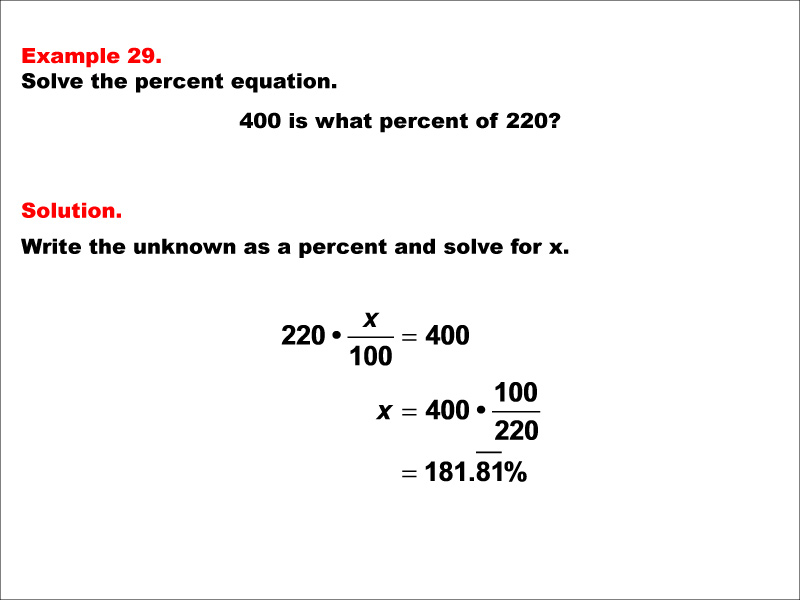
Display Title
Math Example--Percents--Equations with Percents: Example 29
Display Title
Math Example--Percents--Equations with Percents: Example 29

Topic
Solving Equations
Description
This math example focuses on solving percent equations by asking "400 is what percent of 220?" The solution involves setting up the equation 220 * (x / 100) = 400, then solving for x to get x = 400 * (100 / 220), which equals 181.81%. This example demonstrates how to calculate a percentage when the first number is nearly double the second, resulting in a percentage between 150% and 200%.
Solving equations with percents is a critical skill in mathematics that finds applications in various fields such as finance, statistics, and data analysis. These examples help students grasp the fundamental concept of relating two values through percentages and how to set up equations to solve for unknown percentages, particularly when dealing with significant increases or growth rates. This understanding forms the basis for more complex mathematical operations and real-world problem-solving scenarios, such as calculating substantial percentage increases, analyzing growth rates, or understanding relative values in different contexts.
Providing multiple worked-out examples is essential for students to fully comprehend this concept. Each new example reinforces the process while introducing different scenarios and number relationships. This approach allows students to recognize patterns, adapt their problem-solving strategies, and build confidence in handling diverse percentage-based calculations. By practicing with various value pairs, including those that result in percentages between 100% and 200%, students develop a more nuanced understanding of how percentages relate different quantities and prepare for more advanced mathematical challenges they may encounter in higher education or professional settings.
Teacher Script: "Let's examine this interesting percent problem. We're asked, '400 is what percent of 220?' To solve this, we set up the equation 220 * (x / 100) = 400. Now, how do we solve for x? We multiply both sides by 100/220. This gives us x = 400 * (100 / 220), which equals 181.81%. Notice that our result is between 150% and 200%. This means that 400 is almost twice as large as 220. In real-world scenarios, you might encounter situations where you need to express one value as a percentage of a smaller value, often when calculating substantial growth or increase rates. For example, if a company's sales grew from $220 million to $400 million, you could say they experienced a 181.81% increase. Understanding these concepts is crucial for analyzing significant growth rates, comparing values across different scales, and interpreting proportions in various fields like business expansion, population growth studies, or market trend analysis."
For a complete collection of math examples related to Solving Equations click on this link: Math Examples: Equations with Percents Collection.
| Common Core Standards | CCSS.MATH.CONTENT.6.EE.B.5, CCSS.MATH.CONTENT.7.RP.A.3, CCSS.MATH.CONTENT.6.RP.A.3.C |
|---|---|
| Grade Range | 5 - 8 |
| Curriculum Nodes |
Algebra • Expressions, Equations, and Inequalities • Solving Percent Equations |
| Copyright Year | 2013 |
| Keywords | Percent, equation, solution, solving equation, percentage |